The Trybuna Pratsi newspaper from the village of Ivankiv in the Kyiv Region, which was under occupation in the spring of 2022, was forced to stop publishing for six months due to financial constraints. After the de-occupation of Ivankiv, the newspaper’s editor-in-chief, Pavlo Smovzh, was able to publish several issues on his own and then announced to readers that the media would stop publishing. Recently, the newspaper received donor funding and equipment.
On January 25, 2023, the first issue of the newspaper was published after its restoration. This was made possible thanks to the support of the National Union of Journalists of Ukraine, which recommended Trybuna pratsi to the Academy of Ukrainian Press for 10 months of funding.
The leaders of the NUJU and AUP, Sergiy Tomilenko and Valeriy Ivanov, as well as the AUP Executive Director, Andriy Kovalenko, visited the editorial office and presented a laptop, a mobile phone, and a high-capacity solar-powered power bank to Pavlo Smovzh.
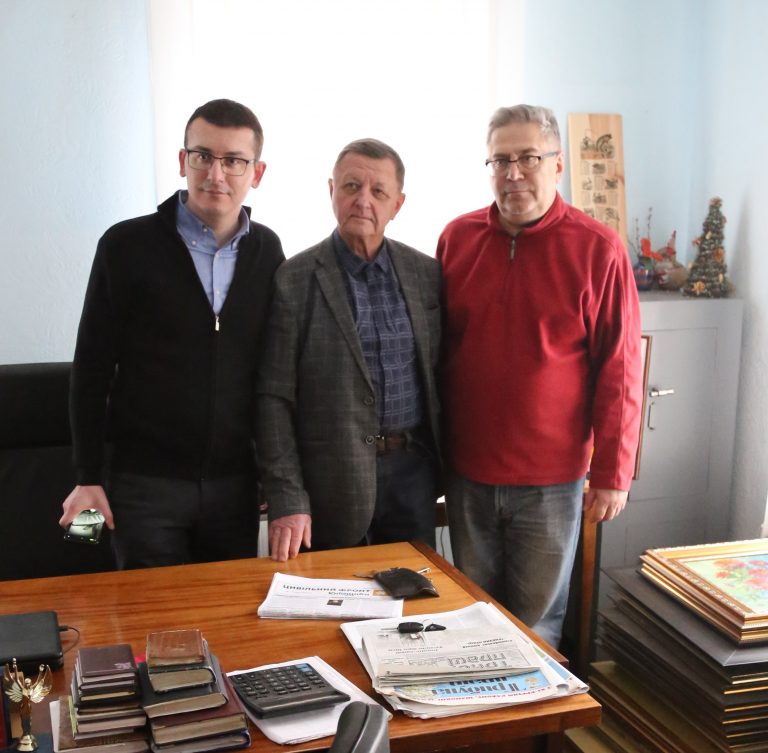
Today, Mr. Pavlo is the only one who creates the newspaper. He can’t even afford an accountant.
– I’m not afraid of it, and I consistently publish the newspaper every week. We distribute most of the circulation free of charge (through village elders, librarians, and social workers) and sell 400 copies in stores. I write about the restoration of the Ivankiv community, fellow citizen soldiers, about the liberators of the Kyiv Region and give various useful tips… The readers are very satisfied. When I wrote on Facebook that the newspaper was coming back, I received hundreds of positive responses and thanks. In times of war, this is not a business; it is an information struggle and serious work, – the editor emphasized.
There is a book of his own about the Holodomor in Ukraine in the 1930s on the table in his office. The author himself says that he would never have thought that he would be forced to live through such a horror…
– My wife keeps chickens, so I had some grain. In addition, I had a small grain crusher. I ground this grain and sifted it. My wife baked bread. I have terrible photos of that bread… like during the Holodomor, but still bread… There is also a fish processing plant near Ivankiv, and when there was no electricity, there was no way to enrich the water with oxygen, so the managers of the enterprise gave away fish free of charge. My friends and even strangers brought me fish. We survived somehow, – Pavlo Smovzh recalls with tears in his eyes in March 2022. – In the early days, the Kadyrives came to Ivankiv and did not come apart: they shot at whomever they saw. Even at dogs, not just at people. A woman was walking down the street, and they shot her with an automatic weapon – both legs were broken. Just like that. A 60-year-old woman, what threat did she pose? Houses in the villages are broken. In my native village of Teterivske, 111 houses were razed to the ground…
Pavlo Smovzh did not have time to leave and would not have been able to. His wife’s mother is 91 years old and hardly moves. Moreover, there was no time to think. On February 24, in the afternoon, the occupiers were already in Ivankiv.
Pavlo Yakovych has been heading the editorial office of the Trybuna Pratsi newspaper for many years. The old building, which is more than a century old, is located in the very center of Ivankiv. Thank God, the building was not badly damaged during the occupation – the explosion smashed the glass and damaged the walls… However, the Russians made a mess of the inside.
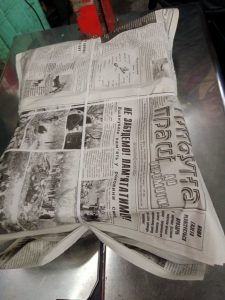
– You can see that they used «serious metal pieces», – says Mr. Smovzh. – They also tore the bars off one window – they did not enter through the door. They tore out several doors inside and made a mess. In the office, they just turned everything out of the tables, cabinets, drawers… The stolen documents and the remains of computers and other editorial equipment were later found in the school of the neighboring village where the occupiers were based.
After the liberation of Ivankiv, funds for new equipment had to be looked for.
– Then, the NUJU came to the rescue. Thanks to the leader of the organization, Sergiy Tomilenko, I received a computer from the editorial office of The Washington Times, – says the editor.
Pavlo Smovzh traveled to all the villages of the district to the places of «war arrivals» and recorded everything. There were some interesting finds, such as a note from a Russian pilot who was sent to bomb villages near Kyiv. Nevertheless, the plane was shot down.
– The note contained the coordinates: Prybirsk is our village nearby, Ivankiv, Gostomel… I myself took photos of everything the Russians had done, – Pavlo Smovzh continues his story.
After the liberation, the newspaper had to be published by Pavlo alone and almost at his own expense, borrowing a lot of money to ensure that readers had information and knew the truth about Russian crimes in the war against Ukraine.
– I had 71 thousand hryvnias of debt at the end of the first half of the year… I had no money to pay the salary, no for the printing house. Therefore, I wrote to our readers that we were going through a rough patch and had to stop printing, – the journalist says.
For some time, Pavlo Smovzh contributed to other publications. Later, at the request of the Gostomel military administration, he published a leaflet Bulletin of Gostomel for the city community and a regional print publication Civil Front of Kyiv Region. At the same time, he paid off the debts of Trybuna Pratsi, all 71 thousand, and gave the employees their unpaid salaries. Now, thanks to philanthropists, he has resumed publishing his native newspaper.
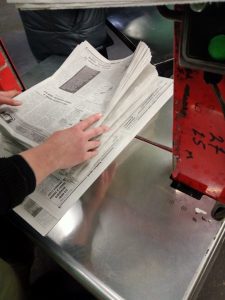
– I can’t imagine myself without journalism. That’s why I would like to continue working as long as I have the strength to provide people with truthful, objective information, – says Pavlo Smovzh. – I can afford it thanks to the funds from financial donors, which the National Union of Journalists of Ukraine helped to attract (there is practically no advertising in our war-torn area). I am grateful to The Washington Times for the computer equipment, the Academy of Ukrainian Press, and the U.S. Embassy in Ukraine for the financial support that allowed reviving the newspaper for the second time.
https://www.youtube.com/shorts/3pYmPynYZG0
This story about the media was created by the NUJU in the frame of the project «Improving Ukrainian Media Resilience in Ukraine», financed by Swiss Solidarity and implemented with the support of the Swiss non-profit organization Fondation Hirondelle and the Institute for Regional Media and Information (IRMI, Ukraine). Fondation Hirondelle and IRMI implement a project of institutional support for Ukrainian media editorial offices in the east, north, and south of our country, with an emphasis on the local press. They also launched a 10-month support program for 18 media.

 THE NATIONAL UNION OF
JOURNALISTS OF UKRAINE
THE NATIONAL UNION OF
JOURNALISTS OF UKRAINE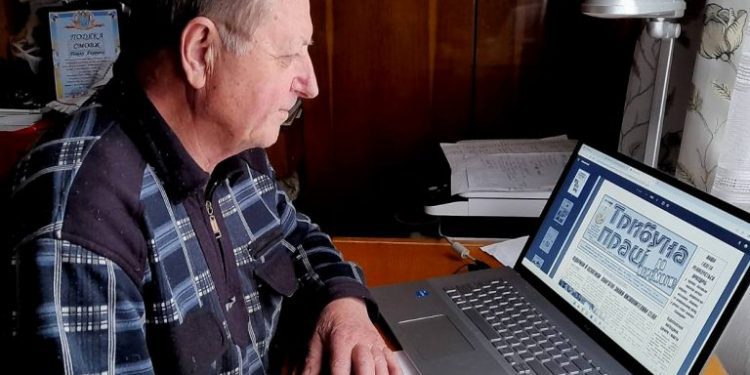
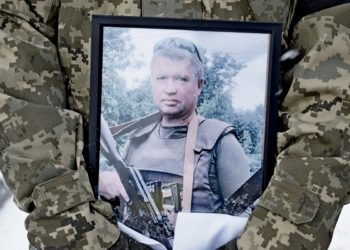

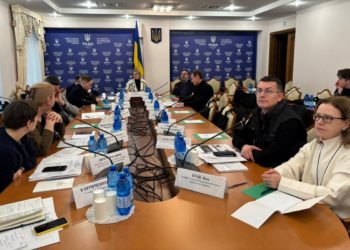












Discussion about this post